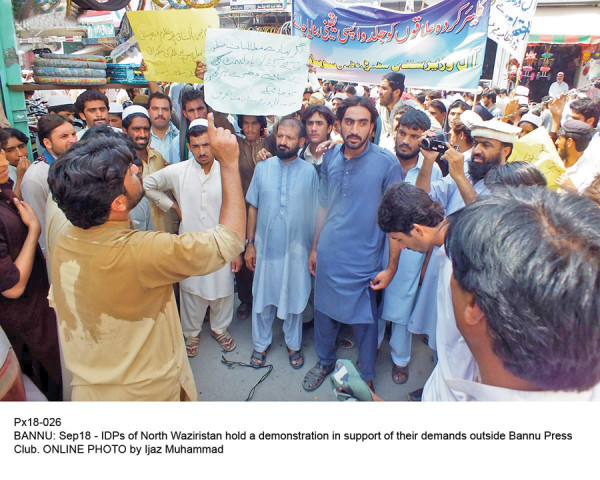Collateral damage: IDPs in DI Khan stuck in a quandary
Women find their mobility restricted and yearn for freedom of movement they enjoyed in their native North Waziristan.

Since the military offensive began in North Waziristan Agency, a large number of internally displaced persons (IDP) have relocated to DI Khan. Thus, the city is once again hosting a displaced population which is in desperate need of attention. In 2009, the city received a large number of IDPs when Operation Rah-e-Nijat was launched in South Waziristan.
Uprooted from their settled life in North Waziristan, the displaced population is facing countless problems. They have limited sources of income and their children do not have access to education. Above all, they are finding it difficult to adjust to life in the city.

The displaced families are accustomed to living in fort-like houses which are big enough to accommodate large families and keep pet animals and cattle. Moreover, women find their mobility restricted in the city and yearn for the freedom they enjoyed back home.
Overwhelmed by the electrifying pace of city life, these women are left with fond memories of the life they have left behind.
“Back home, we would graze cattle, collect firewood and celebrate our rituals,” Neshthara Bibi, a 61-year-old IDP from Speen Waam said.
She added, “Since we left home, I have only been sitting idle. I have been unable to speak to other women from the village and do not know what is going on in Waziristan. Life is extremely difficult here and I wish I could go home.”
Nowhere to go
The IDPs from North Waziristan are facing difficulties in finding a place to live. Some displaced people who had initially sought shelter in school buildings have been asked to find alternative living arrangements. Those who do not have relatives in the city have been forced to rent houses at exorbitant prices.
Noor Zali Khan, an elderly man who was displaced from Mirali, now lives in DI Khan in a three-room rented house with 97 members of his family. “We live in an uncomfortable situation. Sometimes we have to sleep in the yard and on the roof,” he said.
“Our wives always complain and insist we should find a better place to live. But we are stuck. We cannot go back until the military operation is over and we also do not have money to afford a better house,” Noor added.
A roof over your head
Khidmat-e-Khalq Committee, a 24-member board, has been established to address the plight of the displaced population in DI Khan.
According to Sher Adam Khan— who is both a member and an IDP who fled Datta Khel when Operation Zarb-e-Azb was launched—the committee seeks to cooperate with the displaced people and find suitable accommodation for them.
“We are finding it difficult to address the needs of all displaced families and the government should take notice of the situation,” he said.
Large families have been forced to live in small houses in the city and most of them are struggling to pay the high rent, he added.
At a jirga of the Khidmat-e-Khalq Committee held earlier in Haq Nawaz Park, the Khyber-Pakhtunkhwa government was urged to rehabilitate the displaced people.
“We have conveyed our concerns to the media and the governor of K-P,” Sher said.
In order to avoid a crisis, the district government of DI Khan has demanded relief goods, especially tents. However, there are no IDP camps in the city and it is difficult to envisage the benefits of bringing in tents to resolve the extent of the ordeal faced by IDPs. The issue can only be tackled responsibly if a broader approach is adopted to address their problems.
Published in The Express Tribune, September 22nd, 2014.












COMMENTS
Comments are moderated and generally will be posted if they are on-topic and not abusive.
For more information, please see our Comments FAQ